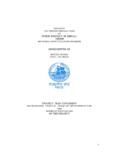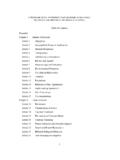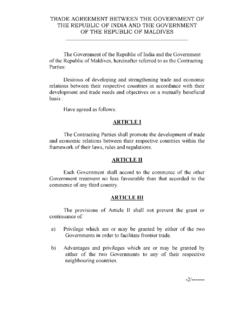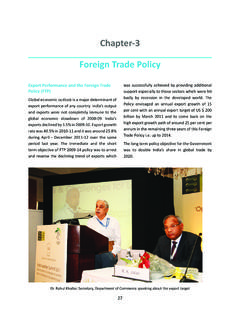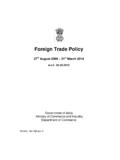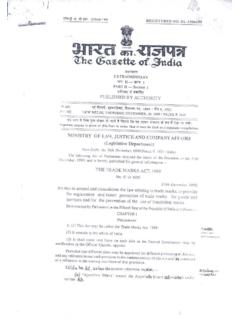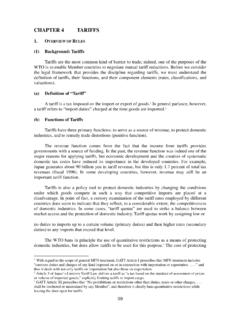Transcription of CONTENTS
1 CONTENTS PAGEPREAMBLE 1 CHAPTER ONEGENERAL PROVISIONS AND DEFINITIONS2 CHAPTER TWOTRADE IN GOODS6 ANNEX 2B18 CHAPTER THREERULES OF ORIGIN19 ANNEX 3A: PRODUCTS SPECIFIC RULES ANNEX 3B APPENDIX 3B-129 52 56 CHAPTER FOURORIGIN PROCEDURE57 ANNEX 4A ANNEX 4B68 69 CHAPTER FIVETRADE FACILITATION AND CUSTOMS COOPERATION 71 CHAPTER SIXTRADE IN SERVICES 77 ANNEX 6A: india S SCHEDULE ANNEX 6B: KOREA S SCHEDULE ANNEX 6C: FINANCIAL SERVICES 94 137 187 CHAPTER SEVENTELECOMMUNICATION 193 CHAPTER EIGHTMOVEMENT OF NATURAL PERSONS204 ANNEX 8A: PROFESSIONALS211 CHAPTER NINEAUDIO VISUAL COPRODUCTION217 CHAPTER TENINVESTMENT218 ANNEX 10A: EXPROPRIATION ANNEX 10B: SECURITY EXCEPTIONS FOR INVESTMENT ANNEX 10C: NON JUSTICIABILITY OF SECURITY EXCEPTION 233 234 235 CHAPTER ELEVENCOMPETITION236 CHAPTER TWELVEINTELLECTUAL PROPERTY RIGHTS238 CHAPTER THIRTEENBILATERAL COOPERATION240 CHAPTER FOURTEENDISPUTE SETTLEMENT ANNEX 14 A: MODEL RULES OF PROCEDURE247 254 CHAPTER FIFTEENADMINISTRATIVE AND FINAL PROVISIONS257 ANNEXES ANNEX I: EXPLANATORY NOTES SCHEDULE OF KOREA SCHEDULE OF india ANNEX II.
2 EXPLANATORY NOTES SCHEDULE OF KOREA SCHEDULE OF india 261 265 278 311 313 343 ANNEX 2A TARIFF REDUCTION OR ELIMINATION365 india S SCHEDULE OF TARIFF CONCESSIONS KOREA S SCHEDULE OF TARIFF CONCESSIONS 367 787 APPENDICESEXCHANGE NOTES EXCHANGE NOTES MAP (GIC) PREAMBLE The Republic of india (hereinafter referred to as india ) and the Republic of Korea (hereinafter referred to as Korea ), and hereinafter referred to jointly as Parties and individually as Party : RECOGNISING their long-standing friendship, strong economic ties and close cultural links; RECALLING the establishment of the Joint Study Group to examine the benefits of a Comprehensive Economic Partnership Agreement (hereinafter referred to as CEPA ) between india and Korea in January 2005, and its recommendations, which served as the framework for negotiations on the CEPA and its structure as an integrated package of agreements; CONSIDERING that the expansion of their domestic markets, through economic integration, is important for accelerating their economic development; DESIRING to promote mutually beneficial economic relations; SHARING the belief that the CEPA would improve their attractiveness to capital and human resources, and create larger and new markets, to expand trade and investment not only between them but also in the region.
3 AFFIRMING their commitment to fostering the development of an open market economy in Asia, and to encouraging the economic integration of Asian economies in order to further the liberalisation of trade and investment in the region; REAFFIRMING that this Agreement shall contribute to the expansion and development of world trade under the multilateral trading system embodied in the WTO Agreement; BUILDING on their respective rights and obligations under the WTO Agreement and other bilateral, regional and multilateral instruments of cooperation to which both Parties are party; FURTHER REAFFIRMING their rights to pursue economic philosophies suited to their development goals and their rights to realise their national policy objectives; RECOGNISING that economic and trade liberalisation should allow for the optimal use of natural resources in accordance with the objective of sustainable development, seeking both to protect and preserve the environment; and RESOLVED to promote reciprocal trade and investment, and to avoid circumvention of benefits of regional trade integration, through the establishment of clear and mutually advantageous trade rules, and industry as well as regulatory cooperation; HAVE AGREED as follows: 2 CHAPTER ONE GENERAL PROVISIONS AND DEFINITIONS ARTICLE : OBJECTIVES The objectives of this Agreement, as elaborated more specifically through its principles and rules are to: (a) liberalise and facilitate trade in goods and services and expand investment between the Parties.
4 (b) establish a cooperative framework for strengthening and enhancing the economic relations between the Parties; (c) establish a framework conducive for a more favourable environment for their businesses and promote conditions of fair competition in the free trade area; (d) establish a framework of transparent rules to govern trade and investment between the Parties; (e) create effective procedures for the implementation and application of this Agreement; (f) explore new areas of economic cooperation and develop appropriate measures for closer economic partnership between the Parties; (g) improve the efficiency and competitiveness of their manufacturing and services sectors and expand trade and investment between the Parties; and (h) establish a framework for further regional and multilateral cooperation to expand and enhance the benefits of this Agreement throughout Asia, and thereby, to encourage the economic integration of Asian economies.
5 ARTICLE : RELATION TO OTHER AGREEMENTS 1. The Parties reaffirm their existing rights and obligations with respect to each other under existing bilateral, regional and multilateral agreements to which both Parties are party, including the WTO Agreement. 2. In the event of any inconsistency between this Agreement and other agreements to which both Parties are party, the Parties shall immediately consult with each other with a view to finding a mutually satisfactory solution. 3 ARTICLE : GENERAL DEFINITIONS 1. For the purposes of this Agreement, unless otherwise specified: Agreement means the CEPA; central level of government means: (a) for india , the government of the Union of india ; and (b) for Korea, the central level of government; Customs Valuation Agreement means the Agreement on Implementation of Article VII of the General Agreement on Tariffs and trade 1994, contained in Annex 1A to the WTO Agreement; Days means calendar days, including weekends and holidays; Enterprise means any entity constituted or organised under applicable law, whether or not for profit, and whether privately or governmentally owned or controlled, including any corporation, trust, partnership, sole proprietorship, joint venture, association, or similar organisation; Existing means in effect on the date of entry into force of this Agreement.
6 GATS means the General Agreement on trade in Services, contained in Annex 1B to the WTO Agreement; GATT 1994 means the General Agreement on Tariffs and trade 1994, contained in Annex 1A to the WTO Agreement; Goods/products of a Party means all domestic products including manufactures and commodities in their raw, semi processed and processed forms as these are understood in GATT 1994 or such goods as the Parties may agree, and includes originating goods; Government procurement means the process by which a government obtains the use of or acquires goods or services, or any combination thereof, for governmental purposes and not with a view to commercial sale or resale or use in the production or supply of goods or services for commercial sale or resale; Harmonised System (HS) means the nomenclature of the Harmonised Commodity Description and Coding System defined in the International Convention on the Harmonised Commodity Description and Coding System including all legal notes thereto, as adopted and implemented by the Parties in their respective tariff laws; Measure means any measure by a Party, whether in the form of a law, regulation, rule, procedure, decision, administrative action, or any other form; Measures by Parties means measures taken by: 4 (a) central, regional, or local governments and authorities; and (b) non-governmental bodies in the exercise of powers delegated by central, regional or local governments or authorities; National means: (a) for india , natural persons deriving their status as Indian citizens from the law in force in india .
7 (b) for Korea, a Korean as defined in Article 2 of the Constitution of Korea and its laws; and Originating goods means goods qualifying under Chapter Three (Rules of Origin); Person means a natural person or an enterprise/juridical person; Person of a Party means a national or an enterprise/juridical person of a Party; Preferential tariff treatment means the duty rate applicable under this Agreement to an originating good ; Regional level of government means, for india , the state and the Union Territories of india ; for Korea, regional level of government is not applicable; Safeguards Agreement means the Agreement on Safeguards, contained in Annex 1A to the WTO Agreement; SPS Agreement means the Agreement on the Application of Sanitary and Phytosanitary Measures, contained in Annex 1A to the WTO Agreement; TBT Agreement means the Agreement on Technical Barriers to trade , contained in Annex 1A to the WTO Agreement; Territory means: (a) for india , the territory of india including its territorial seas and the air space above it and other maritime zones including the Exclusive Economic Zone and the continental shelf over which india has sovereignty, sovereign rights or exclusive jurisdiction in accordance with its laws in force, the 1982 United Nations Convention on the Law of the Sea and International Law.
8 And (b) for Korea, the land, maritime, and air space over which Korea exercises sovereignty, and those maritime areas, including the seabed and subsoil adjacent to and beyond the outer limit of the territorial seas over which it may exercise sovereign rights or jurisdiction in accordance with international law and its law; 5 TRIPS Agreement means the Agreement on trade -Related Aspects of Intellectual Property Rights, contained in Annex 1C to the WTO Agreement; WTO means the World trade Organization; and WTO Agreement means the Marrakesh Agreement Establishing the World trade Organization, done on 15 April 1994. 2. In this Agreement, all words in the singular shall include the plural and all words in the plural shall include the singular, unless otherwise indicated in the context. 6 CHAPTER TWO trade IN GOODS ARTICLE : DEFINITIONS For the purposes of this Chapter: Anti-Dumping Agreement means the Agreement on Implementation of Article VI of GATT 1994; Carnet Convention means the Customs Convention on the Carnet for the Temporary Admission of Goods, done on 6 December 1961; carnet has the same meaning as defined in the Carnet Convention; customs duties1 includes any duty or charge of any kind imposed in connection with the importation of a good , but does not include any: (a) charge equivalent to an internal tax imposed consistently with Article III: 2 of GATT 1994; (b) duty applied consistently with Articles through.
9 (c) fee or other charge that is limited in amount to the approximate cost of services rendered, and does not represent a direct or indirect protection for domestic goods or a taxation of imports for fiscal purposes; (d) premium offered or collected on an imported good arising out of any tendering system in respect of the administration of quantitative import restrictions or tariff rate quotas; or (e) duty imposed pursuant to Article 5 of the Agreement on Agriculture, contained in Annex 1A to the WTO Agreement; and MFN means most favoured nation treatment in accordance with Article I of GATT 1994. ARTICLE : SCOPE AND COVERAGE This Chapter applies to trade in goods between the Parties. 1 Customs duties for india refer to basic customs duties as specified in the First Schedule to the Customs Tariff Act, 1975 of india .
10 This is without prejudice to Korea s position either on the definition of customs duties or on the consistency of india s internal tax or charge equivalent to an internal tax with Article of this Chapter or Article III of GATT 1994. 7 Section A: National Treatment and Market Access for Goods ARTICLE : NATIONAL TREATMENT Each Party shall accord national treatment to the goods of the other Party in accordance with Article III of GATT 1994, including its interpretative notes, which is hereby incorporated into and made a part of this Agreement, mutatis mutandis. ARTICLE : REDUCTION OR ELIMINATION OF CUSTOMS DUTIES 1. Except as otherwise provided for in this Agreement, each Party shall reduce or eliminate its customs duties on originating goods of the other Party in accordance with its Schedule to Annex 2-A. 2. Upon the request of either Party, the Parties shall consult each other to consider the possibility of accelerating the reduction or elimination of customs duties as set out in their Schedules to Annex 2-A including the goods that are exclu

